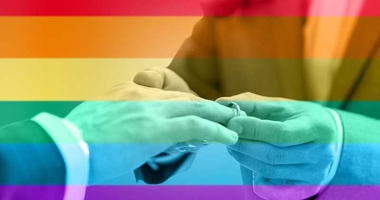Gay teacher sues over firing from North Carolina high school

RALEIGH, N.C. (AP) — A gay teacher sued a Roman Catholic school on Wednesday for firing him after he announced his wedding to a man, the latest in a series of legal fights over antidiscrimination protections for LGBT people.
The lawsuit argues Charlotte Catholic High School violated federal employment law by firing Lonnie Billard from a substitute teaching role in 2014 after a Facebook post about his wedding. While the lawsuit doesn't invoke state law, it comes amid protracted litigation over a North Carolina law limiting protections for LGBT people.
Billard taught English and drama full time at the school for more than a decade, earning its Teacher of the Year award in 2012. He then transitioned to a role as a regular substitute teacher, typically working more than a dozen weeks per year, according to the lawsuit.
He posted about his upcoming wedding in October 2014, and was informed by an assistant principal several weeks later that he no longer had a job with the school.
Not long after that, local diocese spokesman David Hains publicly stated that Billard was let go for "going on Facebook, entering into a same-sex relationship, and saying it in a very public way that he does not agree with the teachings of the Catholic Church," according to the lawsuit.
Hains said Wednesday that officials from the diocese hadn't seen the lawsuit and typically don't comment on pending litigation.
Billard's lawyers argue the firing violates prohibitions against sex discrimination under Title VII of the Civil Rights Act.
"I know that the Catholic Church opposes same-sex marriage, but I don't think my commitment to my husband has any bearing on my work in the classroom," Billard said in a statement. "I have never hidden the fact that I'm gay and my relationship with my partner was no secret at school."
The U.S. Equal Employment Opportunity Commission, which determined Billard has the right to sue, says on its website that religious organizations can give employment preference to members of the faith but can't otherwise discriminate against protected classes of people.
The commission's position is that the definition of "sex" contained in Title VII protects lesbian, gay, bisexual and transgender people from workplace discrimination. It says a number of federal court decisions support the view that sexual orientation is covered under prohibitions against sex discrimination.
However, a law professor who has studied the rulings involving LGBT rights and Title VII said that it is not a settled matter of law.
"Several cases in the last few years offer more support for the point that Title VII protects against employment discrimination based on sexual orientation, but in my view don't definitively resolve the issue," Maxine Eichner of the University of North Carolina said in an email.
The issue of how sex discrimination is defined under federal law plays an important role in current high-profile cases on gender identity. A case scheduled to be heard by the U.S. Supreme Court this year involves a transgender teen who sought access to the boys' bathroom at his Virginia high school. Central to that case is the interpretation of sex discrimination under a separate federal education discrimination law known as Title IX.
Meanwhile, challenges to a North Carolina law limiting LGBT protections hinge on many of the same principles and are largely on hold pending the outcome of the Supreme Court case. North Carolina's law, known as House Bill 2, excludes gender identity and sexual orientation from statewide antidiscrimination protections. It also requires transgender people to use restrooms in many public buildings that correspond to the sex on their birth certificates.
___
Follow Drew at www.twitter.com/jonldrew
By JONATHAN DREW , Associated Press.
Copyright Associated Press. All rights reserved.
The Gayly - 1/11/2017 @ 1:49 p.m. CST.





